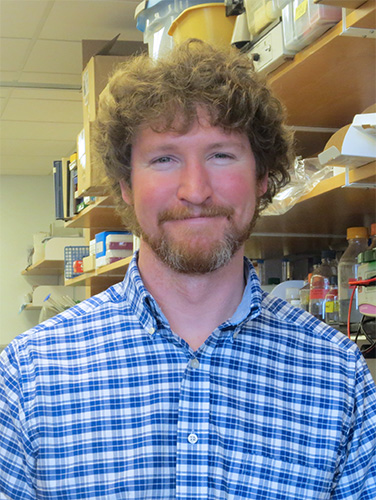
Congratulations to Tim Stuhlmiller, a postdoctoral fellow in the Johnson Lab, for being selected to receive a Joseph S. Pagano Award for one of the best papers by a Lineberger Comprehensive Cancer Center postdoctoral fellow in 2015: “Inhibition of Lapatinib-induced Kinome Reprogramming in ERBB2-positive Breast Cancer by Targeting BET Family Bromodomains” in Cell Reports!
The paper’s high impact in the breast cancer research field
“The paper has had an amazingly high impact in the breast cancer research field because of Tim’s discovery that BET bromodomain inhibitors are able to block the transcriptional adaptive response to targeted kinase inhibitors. The paper was the first to show that BET bromodomain inhibitors could prevent adaptive resistance to a targeted kinase inhibitor. He also showed that treatment of cells made resistant to lapatinib became sensitive to lapatinib when incubated with a BET bromodomain inhibitor. This is the first demonstration of how a small molecule epigenetic inhibitor can be used to prevent and also reverse resistance to a kinase inhibitor. The work has significance as a strategy to use epigenetic inhibitors in combination with kinase inhibitors for durable responses in the clinic.”
Tim’s description of the paper and it’s significance for his Pagano Award application
“This work defined adaptive responses to the HER2/EGFR kinase inhibitor lapatinib in HER2+ breast cancer and presented a novel combination therapy to limit adaptive resistance. Combining a chemical proteomics method with deep RNA sequencing, I defined a substantial reorganization of signaling and transcriptional networks that rapidly activated multiple compensatory signaling pathways. This provided a comprehensive, global perspective to the dilemma of adaptive resistance and found a surprising heterogeneity and breadth of reprogramming. Variability and functional redundancy among compensatory kinases could not be addressed by combinations of two or even three kinase inhibitors. This underscored a fundamental challenge in the clinical application of targeted kinase inhibitors, where the resiliency of the kinome bypasses targeted inhibition by multiple mechanisms. Taking an epigenetic approach, I discovered that targeting the BET family of chromatin readers prevented the lapatinib- induced transcriptional upregulation of multiple receptor tyrosine kinases, leading to durable inhibition of cancer cell growth. This pioneering work identified a novel therapeutic combination to combat adaptive resistance at an epigenetic level. Because such adaptive responses occur in every cancer type to virtually every targeted kinase inhibitor, this finding potentially serves as a paradigm shift in how combination therapies could be approached in the clinic.”
The work was funded by the Komen Foundation and they published a Susan G. Komen Science Buzz! highlighting Tim’s paper.
Tim will receive a check for $2500 as part of the award and present a 20-minute talk on his work at the Annual Postdoc-Faculty Day on October 16, 2016.
Read Tim’s paper in Cell Reports, 11(3):390-404, 2015, PMID: 25865888.
